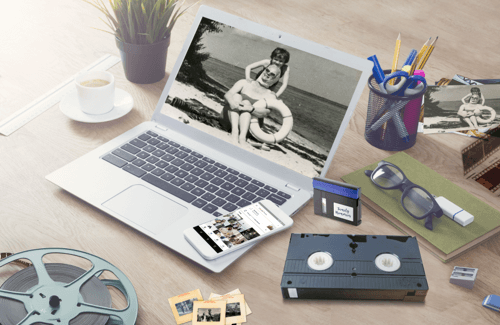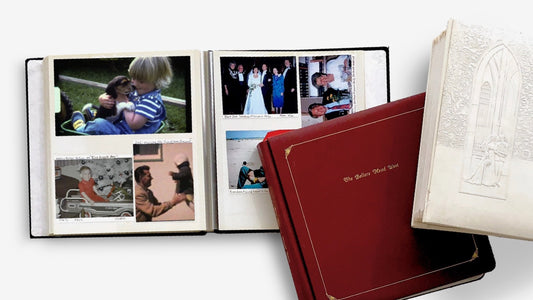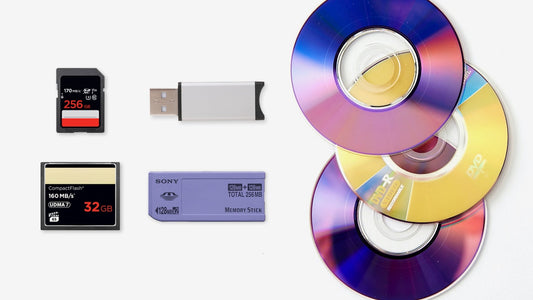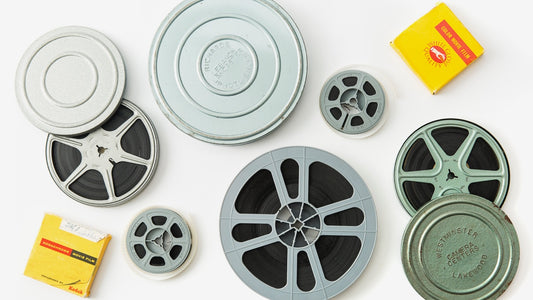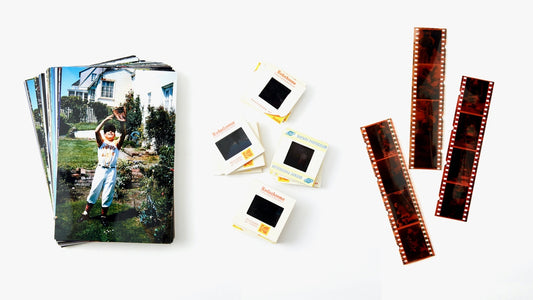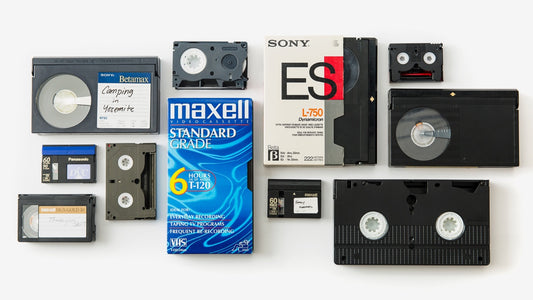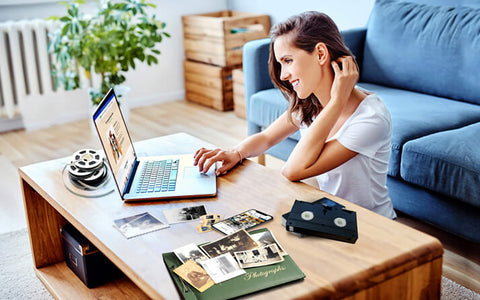Home movies are time capsules filled with laughter, tears, and moments we cherish forever. But those VHS tapes are fragile, and technology marches on. Before those precious memories fade, consider digitizing them with a vcr to digital converter. This comprehensive guide covers everything from choosing the right vcr to digital converter for your needs and budget to troubleshooting common issues and preserving your digital files. We'll also explore the pros and cons of DIY conversion versus professional services, so you can make the best decision for your family's treasured memories.
Key Takeaways
- Preserve your memories with easy digital conversion: From simple DIY devices to professional services, you have options for every budget and tech skill level. Think about how many tapes you have and how much hands-on work you want to do.
- Prioritize quality for lasting memories: Proper tape storage and the right equipment or service are key for clear videos. A little prep work goes a long way in preserving those precious moments.
- Share your digitized videos with loved ones: Easily upload to cloud storage, create shareable links, or make personalized DVDs and USB drives. Digital formats make sharing and enjoying your memories simple and fun.
What is a VCR to digital converter?
A VCR to digital converter is a device that lets you transform those old VHS tapes into digital files. This not only helps preserve precious family memories but also makes them much easier to share—no more lugging around a bulky VCR! These converters are essential for anyone wanting to digitize their home videos for modern viewing and storage.
How these devices work
Converting VCR tapes to digital is surprisingly straightforward. You'll typically connect your VHS player to a video capture device using standard RCA cables, and then link that device to your computer. The converter captures the analog video signal from the VCR and transforms it into a digital file, much like recording something live on your computer. This lets you save your videos directly to your computer or a digital storage device, simplifying access and sharing. For a deeper dive into the world of video transfers, take a look at our video transfer services.
Supported input and output formats
Most VCR to digital converters primarily handle VHS tapes as their main input, typically connecting through those familiar RCA cables. When it comes to output, these devices usually offer popular digital file formats like MP4, AVI, or MOV, ensuring compatibility with most devices and platforms. You can explore more about digitizing your old media with our film transfer and photo transfer services.
Best VCR to Digital Converters
Picking the right VCR to digital converter depends on your tech skills, budget, and video editing needs. Here are a few popular options to consider:
Elgato Video Capture
The Elgato Video Capture is consistently praised for its simple setup and high-quality results. Its user-friendly software walks you through the process, making it a great option if you're new to digitizing home videos. You can find more information on their product features on Elgato's website.
Video2Digital® Converter
The Video2Digital® Converter focuses on ease of use, advertising itself as the world's easiest VHS to digital solution. With simple connections and one-button recording, it's designed to be accessible for everyone.
Roxio Easy VHS to DVD
Roxio Easy VHS to DVD combines straightforward conversion with more advanced editing tools. This offers more flexibility if you're interested in cleaning up your videos or adding transitions and titles. For additional recommendations, check out our resource page on VHS to digital converters.
Diamond VC500
The Diamond VC500 is another solid choice known for its reliable performance and user-friendly design. It's a good option if you prioritize quality and a hassle-free experience.
Vidbox Video Conversion Suite
The Vidbox Video Conversion Suite provides a complete package for converting and editing your VHS tapes. It includes software with various enhancement features, making it a versatile option for those who want more control over the final product.
YesVideo
If you'd rather skip the DIY route, YesVideo offers professional VHS to digital transfer services. We handle everything for you, ensuring your memories are preserved with the utmost care and delivered in a digital format ready to share. Our video transfer service page has all the details on pricing and how to get started.
Key features in a VCR to digital converter
Before you choose a VCR to digital converter, explore key features that will ensure your home movies are preserved in the best possible way. Understanding these features will help you make an informed decision and get the most out of your purchase.
Video quality and resolution
One of the most crucial factors is the output video quality and resolution the converter offers. Look for converters that support at least 720x480 resolution (standard definition). Some converters may offer upscaling capabilities, but remember the original VHS quality will limit true high-definition. If you notice sync issues after the conversion, video editing software can often help.
Ease of use and software compatibility
Not all VCR converters are created equal when it comes to user-friendliness. Some come with intuitive software that guides you through the process, while others might be more complex. Consider your technical skills and choose a converter with software that matches your comfort level. Also, check if the software is compatible with your computer's operating system. A VCR converter transforms your old VHS tapes into digital files, allowing you to preserve and share family memories without needing a bulky VCR.
Editing capabilities
Some VCR to digital converters include basic video editing software. This can be a handy feature for trimming unwanted footage, adjusting brightness and contrast, or adding simple transitions. While these built-in editors may not be as powerful as professional editing software, they can be sufficient for basic touch-ups. If you anticipate needing more advanced editing features, you might want to invest in dedicated video editing software separately.
Connectivity options
VCR to digital converters offer various connectivity options. Most connect to your computer via USB. All-in-one converters simplify the process by eliminating the need for a computer. These standalone devices typically connect directly to your VCR and a USB flash drive or external hard drive. Make sure the converter you choose is compatible with your computer and other devices.
Compatibility with various VCR models
While most VCR to digital converters work with standard VHS players, it's always a good idea to double-check compatibility, especially if you have an older or less common VCR model. Reading user reviews can often provide insights into compatibility issues with specific VCR models. Several VCR to digital converters are available on the market, and the best choice depends on your specific needs, including compatibility with your VCR.
Choose the right VCR to digital converter
Picking the right VCR to digital converter can feel overwhelming with so many options available. But by breaking it down into a few key steps, you can find the perfect device to preserve your precious home movies.
Assess your needs and budget
Before you start browsing, think about what you really need from a converter. Are you comfortable with technology and looking for editing capabilities, or do you prefer a simple plug-and-play solution? Your budget will also play a role in your decision. Basic converters are generally more affordable, while those with advanced features will likely have a higher price tag. For a good overview of what's out there, take a look at this helpful guide on VHS to digital converters.
Compare features and specifications
Once you have a general idea of your needs and budget, start comparing the features and specifications of different converters. Consider factors like video quality, supported formats, and ease of use. Do you need to convert camcorder tapes or other formats besides VHS? Some converters handle various inputs. Making sure your converter and VCR are compatible is essential, so double-check that the converter you choose will work with your existing equipment.
Read user reviews and ratings
Choose the right VCR to digital converter
Picking the right VCR to digital converter can feel overwhelming with so many options available. But by breaking it down into a few key steps, you can find the perfect device to preserve your precious home movies.
Assess your needs and budget
Before you start browsing, think about what you really need from a converter. Are you comfortable with technology and looking for editing capabilities, or do you prefer a simple plug-and-play solution? Your budget will also play a role in your decision. Basic converters are generally more affordable, while those with advanced features will likely have a higher price tag. For a good overview of what's out there, take a look at this helpful guide on VHS to digital converters.
Compare features and specifications
Once you have a general idea of your needs and budget, start comparing the features and specifications of different converters. Consider factors like video quality, supported formats, and ease of use. Do you need to convert camcorder tapes or other formats besides VHS? Some converters handle various inputs. Making sure your converter and VCR are compatible is essential, so double-check that the converter you choose will work with your existing equipment.
Read user reviews and ratings
Before committing to a purchase, take some time to read user reviews and ratings. These can give you valuable insights into how different converters perform in real-life situations. Pay attention to feedback on ease of use, video quality, and any potential issues others have experienced. For example, the Elgato Video Capture device is frequently recommended for its user-friendliness and high-quality output.
Consider long-term value
Finally, think about the long-term value of your investment. A higher-quality video capture device might have a higher initial cost, but it can save you from frustration later. Look for a converter that produces clear, stable video and offers reliable performance. This ensures your digitized memories are preserved in the best possible quality for years to come.
Now that you’re ready to convert those precious memories, let’s troubleshoot some common hiccups you might run into. A little prep work goes a long way!
Address poor video quality
If your converted video looks fuzzy or distorted, don’t panic. First, try adjusting the tracking settings on your VCR. This often solves the problem. A good VCR cleaning kit can also work wonders. Sometimes, the issue isn’t the conversion process itself, but the quality of the original tape. If you've done everything you can and the quality is still poor, consider using a professional service like YesVideo that specializes in enhancing video quality during the transfer process.
Resolve compatibility problems
Compatibility issues between your VCR, converter, and computer can be frustrating. Start by double-checking that your connections are secure. Make sure the RCA cables are firmly plugged into both the VCR and the converter. If you’re still having trouble, exploring different conversion software can sometimes resolve these issues.
Manage large file sizes
Large video files can quickly eat up your computer’s storage space. Converting your videos to a more manageable format like MP4 will help. You can also compress your files without sacrificing too much quality. Consider investing in an external hard drive to keep your memories safe and readily accessible. Cloud storage is another excellent option for archiving your digital files and ensuring they're backed up.
Fix audio sync issues
Audio out of sync with video is a common problem, but usually an easy fix. Most video editing software allows you to adjust the audio track to match the video. There are also free tools available online specifically designed to fix audio sync issues. If the problem is more complex, professional services like YesVideo can often correct these issues during the transfer process.
Deal with equipment malfunctions
Sometimes, despite our best efforts, equipment just malfunctions. If you’re having persistent problems with your VCR or converter, try borrowing one from a friend or family member to isolate the issue. If the problem continues, it might be time to consider replacing the faulty equipment. Another option is to opt for a professional service like YesVideo, where they handle all the technical aspects for you.
DIY conversion vs. professional services
Digitizing your home videos is a smart move, but choosing the right method depends on your priorities. Let's weigh the pros and cons of DIY conversion versus using a professional service.
Pros and cons of using a VCR to digital converter
A VCR converter transforms your old VHS tapes into digital files, letting you preserve and share memories without a bulky VCR. These handy gadgets come in various forms, from simple USB capture devices to all-in-one converters that bypass the need for a computer. Picking the right one depends on your needs and budget, so understanding key features like video quality and software compatibility is important. You can explore some top-rated converters in our guide to the best VCR converters.
However, the DIY route has its drawbacks. Converting older media isn’t always straightforward. Without the right tools or technical know-how, the process can be frustrating. You'll need to invest in the converter itself, plus potentially video editing software. There's also a learning curve involved in setting up the equipment, capturing the footage, and troubleshooting any technical hiccups, like poor video quality or audio sync issues.
Benefits of professional conversion services
If you prefer a hands-off approach, professional services like YesVideo offer a hassle-free experience. We handle everything for you, from carefully handling your tapes to ensuring a high-quality digital transfer. Our video transfer service includes a digital copy and MemoryCloud access, allowing you to easily view, download, order copies, and even save your memories to Google Photos. Plus, all orders are processed by hand in the USA, ensuring the safety and quality of your precious memories.
When to choose each option
So, which route is right for you? If you're tech-savvy, enjoy hands-on projects, and have a limited number of tapes to convert, the DIY approach might be a good fit. Just be prepared for a bit of a learning curve. However, if you have a large collection of tapes, value convenience and high-quality results, or simply want to avoid the technical headaches, a professional service like YesVideo is the best choice. We take the burden off your shoulders, so you can focus on reliving and sharing those precious memories. For more information on our various transfer options, from film transfers to photo transfers, visit our website.
Maintain VHS Tape Quality Before Conversion
Before you convert those precious home videos, take a few steps to ensure your VHS tapes are in the best possible condition. Think of it like prepping ingredients before a big meal—a little care upfront makes a huge difference in the final product.
Proper Storage Techniques
Where you store your VHS tapes dramatically impacts their lifespan. Think cool, dry, and dark—like a wine cellar for your memories. Avoid direct sunlight, which can fade the tape and cause heat damage. Basements and attics, while convenient, are often too humid or experience extreme temperature swings. A closet or shelf in a temperature-controlled room is ideal. Also, keep tapes away from magnetic fields, like speakers or electronics, which can corrupt the magnetic signals on the tape. Storing tapes vertically, like books on a shelf, helps prevent warping and damage to the tape reels. For extra protection, consider using archival-quality storage cases. These protective cases shield tapes from dust, moisture, and light.
Clean and Inspect Tapes
Dust and debris can interfere with playback and transfer quality. Before converting, gently clean your VHS tapes with a soft, lint-free cloth to wipe down the cassette exterior. For the tape heads themselves, use a specialized VHS head cleaner. These cleaners remove dirt and grime without damaging the delicate tape heads. While you're at it, inspect the tape itself for any signs of damage, like mold, mildew, or tears. If a tape looks severely damaged, it's best to consult a professional video transfer service to minimize data loss.
Use Quality Playback Equipment
The VCR you use for playback matters. A high-quality VCR with stable playback capabilities will yield a much better digital transfer than a dusty, worn-out machine. A good VCR will track the tape correctly, minimizing those annoying tracking lines and jitters that can plague old tapes. It will also maintain consistent color and audio quality throughout the playback process. If you're unsure about the quality of your VCR, consider borrowing or renting a higher-end model for the transfer, or explore professional video transfer services, like YesVideo, which use professional-grade equipment to ensure the best possible transfer from your VHS tapes.
Preserve and Share Your Digital Memories
After converting your home videos to digital formats, preserving and sharing those memories becomes easier and more enjoyable. Here's how to make the most of your newly digitized treasures:
Back Up Your Converted Files
Backing up your digital files is crucial for protecting your precious memories. Hard drives can fail and accidental deletions happen, so multiple backups ensure your videos are safe. Consider using a combination of cloud storage services and physical backups like external hard drives or USB flash drives for comprehensive protection. Cloud storage offers convenient access from anywhere, while physical copies provide an extra layer of security. You can learn more about backing up your files from resources like this guide on digitizing old tapes and photos.
Organize Your Digital Archive
A well-organized digital archive makes it simple to locate specific videos and enhances your viewing experience. Create a clear folder structure on your computer or in cloud storage, using descriptive names and dates to identify events. Consider using software that allows tagging and keyword searching for even easier retrieval. YesVideo simplifies this process; their video transfer service includes a Digital Copy and MemoryCloud access, allowing you to view, download, order copies, and save your memories to Google Photos.
Share Digitized Videos with Family and Friends
Sharing your digitized memories with loved ones is one of the greatest joys of video conversion. With digital formats, sharing is simple. You can easily upload videos to cloud storage services and create shareable links. Creating private YouTube or Vimeo channels allows you to curate collections for different groups. Or, create personalized DVDs or USB drives as gifts. USB flash drives make sharing home videos directly simple.
Related Articles
- Best VCR Converters: Digitize Your VHS Tapes – YesVideo
- Convert VHS to Digital: The Ultimate 2024 Guide – YesVideo
- VHS to DVD Converter: 2023 Guide + Top Picks – YesVideo
- VHS Conversion 2024: Complete Guide to Digitizing Tapes – YesVideo
- Video Transfer – YesVideo
Frequently Asked Questions
Why should I convert my VHS tapes to digital? VHS tapes degrade over time, and VCRs are becoming obsolete. Video transferring your tapes to a digital format preserves your memories in a way that's easy to access, share, and enjoy on modern devices for years to come. Plus, you won't have to worry about finding a working VCR!
What’s the easiest way to convert VHS to digital if I’m not tech-savvy? If you're not comfortable with technology, a professional service like YesVideo is your best bet. They handle the entire process, ensuring high-quality transfers without any technical headaches on your part. Alternatively, user-friendly converters like the Video2Digital® Converter are designed for simplicity, even for beginners.
Can I improve the quality of my old VHS tapes during the digital conversion process? While you can't magically transform VHS into high-definition, cleaning your tapes and using a good VCR for playback can significantly improve the transfer quality. Some converters and software offer basic video enhancement features, and professional services like YesVideo specialize in optimizing video quality during the transfer.
What’s the best way to store my digitized videos? For long-term preservation, store your digital videos in multiple locations. Use an external hard drive for a physical copy, and consider cloud storage services for easy access and sharing. Organizing your files into clearly labeled folders will make it easy to find what you're looking for down the road.
What if I encounter problems during the conversion process? Troubleshooting common issues like poor video quality or audio sync problems is often simpler than you think. Check your connections, clean your tapes, and adjust your VCR's tracking. Many converters come with software that can address minor issues. If problems persist, online resources and user forums can offer solutions, or you can opt for professional assistance.
Frequently Asked Questions
Why should I convert my VHS tapes to digital? VHS tapes degrade over time, and VCRs are becoming obsolete. Digitizing your tapes preserves your memories in a format that's easy to access, share, and enjoy on modern devices for years to come. Plus, you won't have to worry about finding a working VCR!
What’s the easiest way to convert VHS to digital if I’m not tech-savvy? If you're not comfortable with technology, a professional service like YesVideo is your best bet. They handle the entire process, ensuring high-quality transfers without any technical headaches on your part. Alternatively, user-friendly converters like the Video2Digital® Converter are designed for simplicity, even for beginners.
Preserve and Share Your Digital Memories
After converting your home videos to digital formats, preserving and sharing those memories becomes easier and more enjoyable. Here's how to make the most of your newly digitized treasures:
Back Up Your Converted Files
Backing up your digital files is crucial for protecting your precious memories. Hard drives can fail and accidental deletions happen, so multiple backups ensure your videos are safe. Consider using a combination of cloud storage services and physical backups like external hard drives or USB flash drives for comprehensive protection. Cloud storage offers convenient access from anywhere, while physical copies provide an extra layer of security. You can learn more about backing up your files from resources like this guide on digitizing old tapes and photos.
Organize Your Digital Archive
A well-organized digital archive makes it simple to locate specific videos and enhances your viewing experience. Create a clear folder structure on your computer or in cloud storage, using descriptive names and dates to identify events. Consider using software that allows tagging and keyword searching for even easier retrieval. YesVideo simplifies this process; their video transfer service includes a Digital Copy and MemoryCloud access, allowing you to view, download, order copies, and save your memories to Google Photos.
Share Digitized Videos with Family and Friends
Sharing your digitized memories with loved ones is one of the greatest joys of video conversion. With digital formats, sharing is simple. You can easily upload videos to cloud storage services and create shareable links. Creating private YouTube or Vimeo channels allows you to curate collections for different groups. Or, create personalized DVDs or USB drives as gifts. USB flash drives make sharing home videos directly simple.




